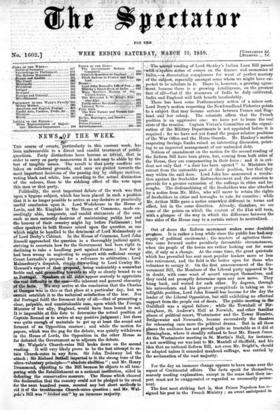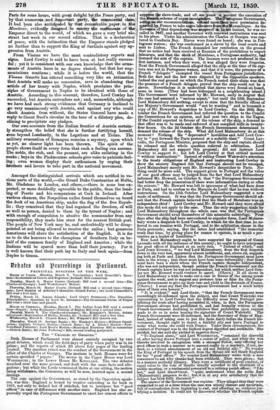For the day an immense change appears to have come
over the aspect of Continental affairs. The facts speak for themselves, scarcely needing explanation, except in the sense that their im- port must not be exaggerated or regarded as necessarily perma- nent.
The first most striking fact is, that Prince Napoleon has re- -signed his post in the French Ministry ; an event anticipated in
Paris for some hours, with great delight by the Peace party, and. by that numerous and. important party, the commercial class.
It had been also anticipated by that remarkable paper in ;the
Moniteur, evidently designed to convey the sentiments of ihe Emperor direct to the world, of which we gave a very brief ab-
stract last week in our second edition. That is a declaration of peace, with the intimation that the Emperor stands pledged no further than to support the Bing of Sardinia against any ag- gression from Austria.
From Vienna we have the most contradictory reports and signs. Lord Cowley is said to have been at last really success- ful; yet it is consistent with our own knowledge that the arma- ments of Austria have in no degree abated, but that her aug- mentations continue ; while it is before the world, that the Vienna Gazette has uttered something very like an intimation that Austria will make no concession, save in abandoning that article of her treaty with Naples, which proclaims the prin-
ciples of Government in Naples to be identical with those of Austria. According to this account, therefore, Lord Cowley has
succeeded, but Austria surrenders not; and, meanwhile, although we have had such strong evidences that Germany is inclined to go very unanimously with Austria, and against any who could
check Austria from without, the States General have made a reply to Count Blies circular in the tone of a dilatory plea, de- clining to precipitate any pledges.
Our own accounts from the Italian frontier of Austria certain- ly strengthen the belief that she is farther fortifying herself, even beyond Lombardy, in the Legations and at Ticino. The military evacuation of Romagna remains a mystery, upon which as yet, no clearer light has been thrown. The spirit of the people shows itself in every form that such a feeling can assume. The noble, the rich, and the peasant, are alike enlisting in the ranks ; boys in the Piedmontese schools give voice to patriotic feel- ing; even women display their enthusiasm by urging their brothers and lovers to take part in the national movement.



























